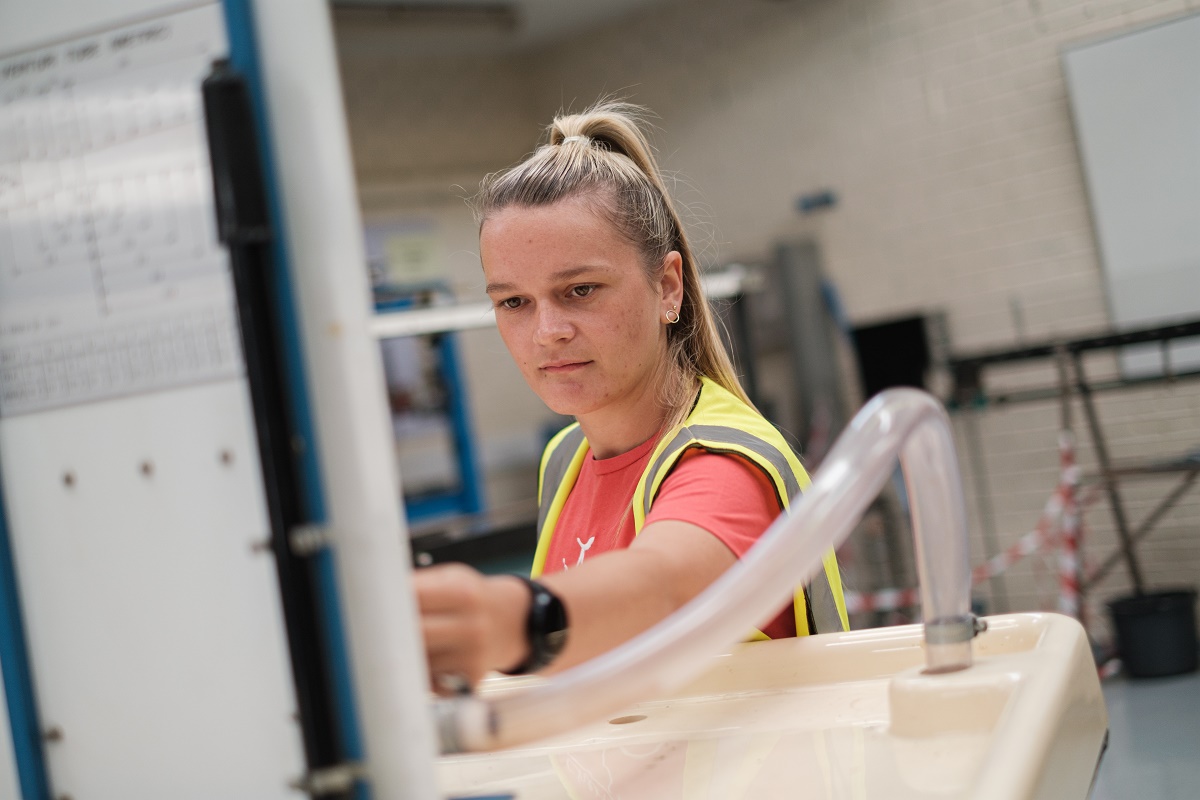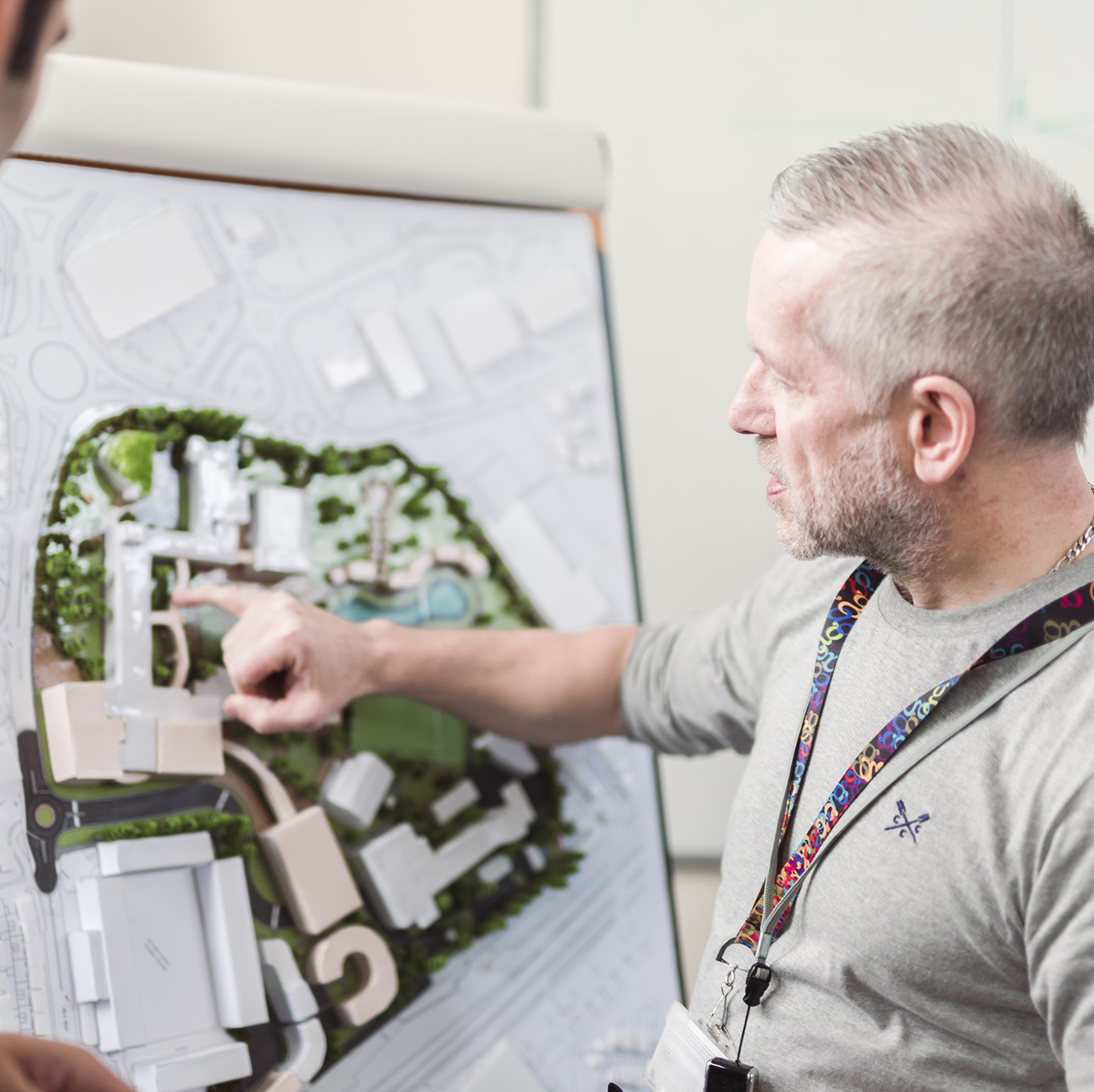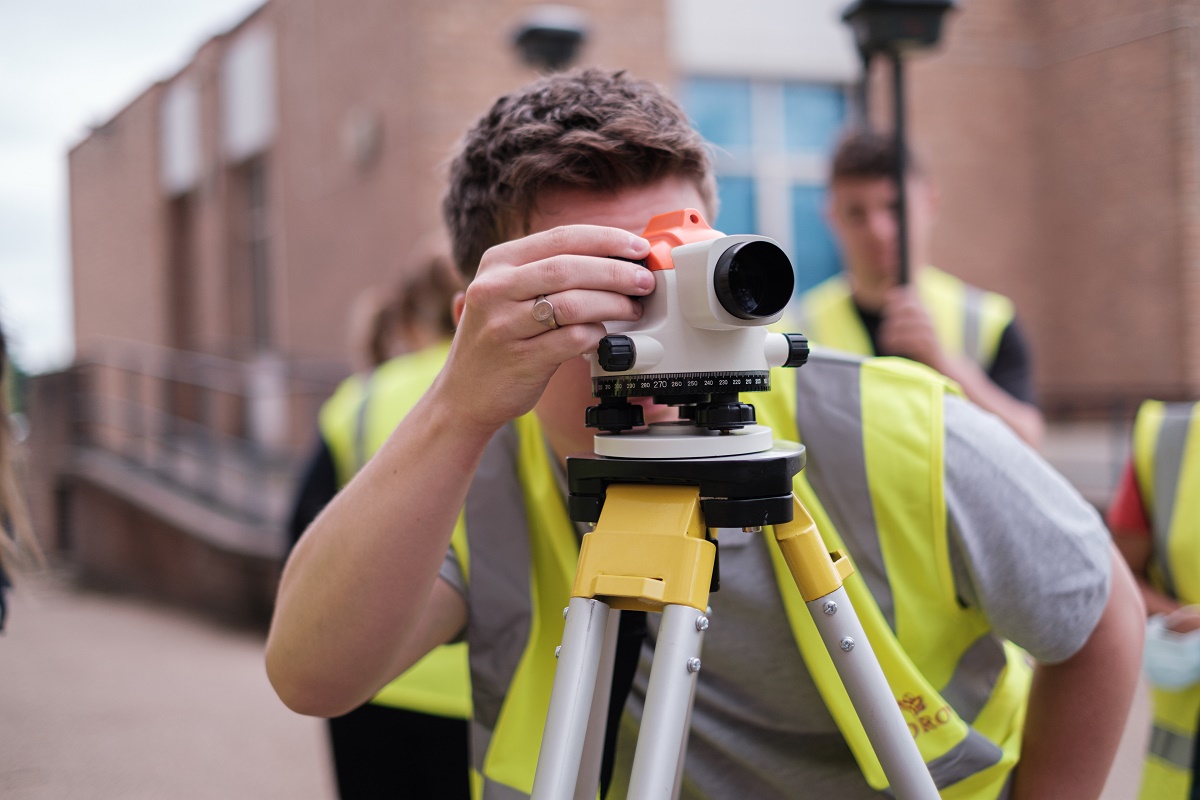BEng (Hons) Civil Engineering (Degree Apprenticeship)

Course details
Year of entry
2026
Duration
4 YRS (PT)
UCAS Tariff
48-72
Institution Code
G53
Location
Blended Learning, Wrexham
Course Highlights
Academic Partnership
between Wrexham and the Institute of Civil Engineers
Fully Funded
*subject to Welsh Government funding allocation
Earn and Learn
Study whilst in full time employment
Why choose this course?
Our Civil Engineering degree is an ideal qualification for those who wish to be challenged yet supported and wish to develop knowledge and skills to equip them to problem solve, communicate and deliver resilient and sustainable engineering solutions for generations to come.
This course:
- Covers aspects such as design, construction and operation of bridges, railways, airports, roads, reservoir’s, tunnels, flood defence, wind turbines, safe streets, active travel, green buildings, waste management and much more.
- Is part of one of the largest employment sectors in the United Kingdom. The Civil Engineering and Construction Industry demands a constant supply of competent Civil Engineering Designers, Contractors, Supervisors, Inspectors, Technicians, Incorporated Engineers and Chartered Civil Engineers to manage existing assets and deliver civil engineering projects of all descriptions.
Key course features
- Joint programme delivery with Coleg Cambria (Year 1 and 2) and Wrexham University (Year 3 and 4) (Work based Learning Year 1 and 2).
- On campus class-based learning lectures and laboratories are primarily one day a week or block delivery (Subject to employer demand).
- The academic partnership between Wrexham University and the Institution of Civil Engineers provides strong links between the university, the Institution and employers across North Wales.
- Expert guidance, support and mentoring by Chartered Civil Engineering lecturers with long-standing industrial experience to support your career growth with your employer.
- Peer learning with your fellow degree apprentices working in different companies and industries in the built environment support symbiotic learning.
- Small tutorial groups allow close tutorial support, including additional sessions to help with maths.
- Wide-ranging industry-standard digital resources available for use on- and off-campus.
- A variety of teaching and learning methods are used to ensure that technical content is applied to work-based scenarios.
- The curriculum aims to provide learning current and future Built Environment practices, in particular supporting apprentices in delivering sustainable and society responsible solutions, for example carbon neutral and renewable energy to benefit all of society.
What you will study
YEAR 1 ( LEVEL 4)
The first year of the BEng (Hons) Civil Engineering programme comprises seven core modules and one optional module. Through this first year you will be provided with opportunities to design simple structures, appreciate fundamental soil behaviour and develop techniques to analyse, and problem solve.
Threaded throughout the modules on the programme are the Joint Board of Moderators themes such as design, health, safety and risk and sustainability, which will provide a pathway to a range of underpinning knowledge, skills and behaviours that contribute to supporting your working role.
MODULES
- Civil Engineering Design (Core)
- Geotechnics (Core)
- Structural Mechanics (Core)
- Analytical Engineering Techniques (Core)
- Science and Materials (Core)
- Work Based Learning 1 (Core)
One of:
- Digital Technologies in Drawing and Modelling (Optional)
- Quantity Surveying (Optional)
YEAR 2 ( LEVEL 4 & 5)
The second year of the Programme builds upon the first and provides opportunities to gain practical experience using industry standard surveying equipment and software.
You will develop your knowledge of fundamental fluid properties and undertake practical laboratory experiments to augment your understanding of hydraulic engineering and sustainable water resource management.
You will consider sustainable approaches to infrastructure design and asset management and demonstrate your knowledge through work-based scenarios and solutions.
MODULES
- Digital Technologies in Surveying (Core)
- Water Resource Management (Core)
- Civil Engineering Maths (Core)
- Work Based Learning 2 (Core)
One of:
- Infrastructure and the Environment (Optional)
- Wind and Hydro Engineering (Optional)
YEAR 3 (LEVEL 5 & 6)
In the third year you will study four modules. The Project Management module offers opportunities for you to demonstrate technical, financial, time and people management skills, required in the execution of typical Civil Engineering projects. Building Information Management within this module provides you with an insight into this innovative technology used to coordinate the full cycle of development, from inception, through the design and construction processes towards the management of the completed project, its potential adaptation and eventually its deconstruction. You will develop personal management skills through communication and group work engagement and consideration of Professional Codes of Conduct.
The Procurement and Contract Practice module addresses the ways in which civil engineering / construction projects are commissioned and implemented towards completion, use and management.
The Individual Research Project will allow you to demonstrate independent learning, critical analysis and synthesising skills, and to demonstrate your understanding of research, analysis and the critical resources required to offer sustainable solutions to civil engineering problems. This module will also provide you with transferable skills such as those required in the creation of technical reports and the preparation and submission of review documentation to Professional Bodies.
MODULES
- Mechanics, Structures and FEA (Core)
- Procurement and Contract Practice (Core)
- Project Management (Core)
- Individual Research Project (Core)
YEAR 4 ( LEVEL 6)
In the final year of the programme, Design for Climate Resilience provides you with an overview of aspects of the Climate Emergency and the impacts on Infrastructure, Society and the Environment. It considers the basis of climate change and identifies environmental impact, assessment, risk and management. The module explores techniques and methods which can be offered up as solutions to reduce impact and improve infrastructure design resilience.
The Major Project (Work based Learning) and all the preceding Work Based learning modules are a significant element of the Degree Apprenticeship programme and provide opportunities to develop and implement knowledge and professional experience which relates not only directly to the workplace but provide apprentices with transferable skills and attributes required to gain Incorporated Engineer status.
A further purpose of this module is to enable students to reflect upon and to develop their own effectiveness in relation to their current employment practice.
MODULES
- Design for Climate Resilience
- Major Project (Work Based Learning)
- Advanced Materials
- Flood Risk Management
The information listed in this section is an overview of the academic content of the programme that will take the form of either core or option modules. Modules are designated as core or option in accordance with professional body requirements and internal academic framework review, so may be subject to change.
Entry requirements & applying
To enrol on the BEng(Hons) Civil Engineering programme, applicants will normally be expected to have previously achieved one of the following as a minimum:
- 48-72 UCAS tariff points from appropriate level 3 qualification such as A Levels, a BTEC National Certificate or Diploma in Civil Engineering.
- 5 GCSEs at grade A*-C, including Maths and English Language/Welsh
Applicants without the necessary UCAS tariff points, or who have qualifications that do not carry UCAS tariff points, will be considered based on their professional experience within the industry they intend to study the apprenticeship in. All applicants who do not meet the above requirements will be interviewed prior to being made an offer, providing those without formal UCAS tariff points the opportunity to demonstrate how their skills and experiences from within the industry make them a suitable candidate for this programme of study.
Teaching & Assessment
Modules are delivered using a variety of teaching and learning techniques, including traditional lectures, practical ‘hands-on’ activities, tutorials and group discussions, laboratory work, construction site-based observation and peer appraisal. The main priority is to ensure that you feel comfortable within the academic learning environment and feel able to contribute to the discussion of subject matter within any class, tutorial or other learning activity that forms part of your studies – teaching and learning is fundamentally a two-way process within which student opinion is vitally important.
A range of assessment methods are used within the programme to simulate the sorts of written, practical, visual and oral communication skills that are expected of civil engineers; written reports, the practical use of technical equipment, visual presentations, laboratory analyses, in-class tests, examinations, coursework and oral presentations are all important ways in which you can demonstrate your understanding. The types of assessment selected for each module have been chosen to develop students and reflect typical work based learning scenario’s.
In terms of particular assessment needs, the University’s Inclusion Services department can provide appropriate guidance and support should any students require reasonable adjustments to be made to assessment processes because of a recognised prevailing disability, medical condition, or specific learning difference.
Career prospects
The BEng (Hons) Civil Engineering Degree Apprenticeship is a qualification that is recognised by Industry and the Professional Bodies as providing graduates with the knowledge, skills and behaviours to provide engineering project solutions in a sustainable, safe and cost effective, practical and technically competent manner.
Civil Engineering Degree Apprenticeships allow you to earn and learn from the onset, developing technical competencies and professional skills to enhance your role in the workplace and transferable skills for future career aspirations.
Civil Engineering is a vibrant, diverse, challenging and rewarding career path. It provides opportunities to be at the forefront of climate resilient design solutions, development of low carbon materials and implementation of sustainable construction practices for the betterment of society now and in the future.
Potential career options include:
- Civil Engineering Design
- Civil Engineering Contracting
- Structural Engineering
- Geotechnical Engineering
- Highway Engineering
- Railway Engineering
- Coastal/Fluvial Engineering
- Project Management
- Water Supply and Infrastructure
- Topographical Surveying
- Construction Health and Safety
- Construction Management
- Environmental Management
- Risk Management
- Alternative Energy Generation
Fees & funding
Subject to satisfying both Degree Apprenticeship eligibility criteria in the Welsh context and Wrexham University entry requirements, the BSc (Hons) Civil Engineering Degree Apprenticeship programme is fully-funded by Welsh Government, subject to availability.
Accommodation
At Wrexham University, we offer on-campus en-suite rooms within our Wrexham Student Village. These private, fully furnished spaces are conveniently located, providing easy access to campus facilities, study areas, and social spaces. Plus, you’re just a 10-minute walk from the city centre!
With all bills included, free Wi-Fi, 24/7 security, and large social areas, you’ll find everything you need for a great student experience.
Explore our student accommodation options to find your perfect home away from home.
Apply Now
Individual Applicants
If you're applying for a Degree Apprenticeship as an individual, please complete our online application form.
Employers
If you're an employer looking to reserve a place for a future apprentice or would like more information about the Degree Apprenticeship on behalf of an employee, please contact us at apprenticeships@wrexham.ac.uk.
Upcoming Open Days.
Join us at an upcoming open day to meet your lecturers, find out more about our courses, discover our facilities and get a taste of student life.
Browse all of our open days & events.



